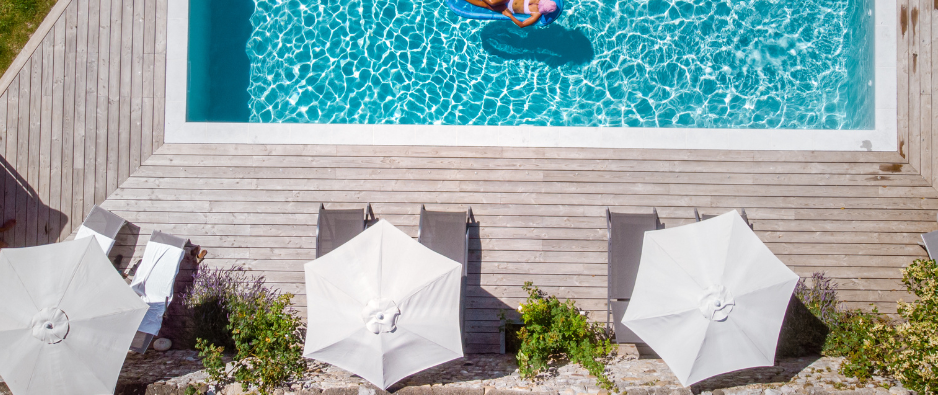CALL US TODAY · 985-333-7896

POOL TIPS
The Ultimate Guide to Maintaining a Sparkling Pool
A well-maintained pool not only enhances the beauty of your outdoor space but also ensures a safe, clean, and enjoyable environment for swimming. Whether you're an experienced pool owner or just beginning your journey, understanding and implementing key maintenance practices is essential to keeping your pool water pristine and inviting year-round.
Daily Skimming: Your First Line of Defense
Keeping your pool free from debris is crucial for maintaining its cleanliness. Make it a daily habit to skim the surface of your pool with a high-quality skimmer. This simple task removes leaves, insects, and other debris before they sink to the bottom and complicate cleaning efforts. Regular skimming not only keeps your pool looking great but also helps prevent the growth of algae and bacteria.
Balancing Water Chemistry: The Key to Crystal Clear Water
Proper water chemistry is the cornerstone of effective pool maintenance. Regularly test your pool water to ensure that the pH, alkalinity, and chlorine levels are within the recommended ranges. Balanced water chemistry not only keeps the water clear but also protects swimmers from harmful bacteria and prevents damage to pool surfaces and equipment. Adjust chemical levels as needed, and consider using a pool water testing kit for accurate results.
Filter Maintenance: Keeping Your Pool’s Circulatory System in Top Shape
Your pool’s filtration system plays a critical role in keeping the water clean and clear. Depending on the type of filter you have—whether it's sand, cartridge, or diatomaceous earth (DE)—regular cleaning or replacement is necessary. A clean filter ensures efficient water circulation, which is essential for evenly distributing chemicals and preventing stagnation. Monitor the filter’s pressure gauge and backwash or clean it as needed to maintain optimal performance.
Water Level Management: Ensuring Optimal Skimming and Filtration
Maintaining the correct water level is crucial for your pool’s skimming and filtration systems to work effectively. Too low a water level can strain the pump, while too high a level can reduce the efficiency of surface skimming. Check your pool’s water level regularly, especially after heavy rain or during periods of high usage, and adjust it as necessary. Unexplained drops in water level may indicate a leak, so it's important to address any significant changes promptly.
Shock Treatments: A Powerful Boost for Pool Health
Even with regular maintenance, your pool will occasionally need a more intensive treatment to keep the water fresh and safe. Shock treatments involve adding a higher-than-normal dose of chlorine or other chemicals to eliminate bacteria, algae, and other organic contaminants. It’s especially important to shock your pool after heavy usage, severe weather, or when the water starts to look cloudy. Regular shock treatments help keep your pool water sparkling clean and free of harmful organisms.
Equipment Checks: Keeping Everything Running Smoothly
Your pool’s mechanical systems, such as pumps, heaters, and automatic cleaners, require regular inspection and maintenance to ensure they’re operating efficiently. Periodically check these systems for signs of wear, leaks, or other issues. Addressing small problems early can prevent them from becoming costly repairs down the line. Additionally, consider scheduling professional inspections to ensure that your pool’s equipment is in top condition.

Seasonal Maintenance: Preparing for Weather Changes
As the seasons change, so do your pool maintenance needs. During the warmer months, increased use and higher temperatures may require more frequent chemical adjustments and filtration checks. As winter approaches, proper winterization is crucial to protect your pool from freezing temperatures. This process includes lowering the water level, adding winterizing chemicals, and covering the pool to prevent debris accumulation. Proper seasonal maintenance helps extend the life of your pool and ensures it’s ready for use when warm weather returns.
Landscaping Considerations: Minimizing Debris and Enhancing Aesthetics
The landscaping around your pool plays a significant role in its maintenance. Strategically placed plants can provide shade and privacy, but they can also contribute to debris in the pool. Choose low-shedding plants and keep trees and shrubs trimmed to minimize leaves and other debris from falling into the water. Mulching the area around your pool can also help reduce dirt and debris, keeping your pool area clean and visually appealing.
Routine Inspections: Preventing Problems Before They Start
Regular professional inspections are an important part of pool maintenance. Even if you’re diligent with your own upkeep, a trained eye can spot potential issues that might otherwise go unnoticed. Routine inspections can catch problems early, preventing costly repairs and ensuring your pool remains in top condition.
Pool Etiquette: Educating Users for a Cleaner Pool
Maintaining a clean pool is a team effort. Educate your family and guests on proper pool etiquette, such as showering before swimming and avoiding using the pool as a restroom. These simple practices can significantly reduce the introduction of contaminants into the water, helping to maintain its clarity and cleanliness.
By incorporating these comprehensive pool maintenance tips into your routine, you can ensure that your pool remains a beautiful and inviting oasis throughout the year. Regular care and attention not only enhance the aesthetic appeal of your backyard but also guarantee a safe and enjoyable swimming experience for you and your loved ones. With the right approach, maintaining a sparkling pool can be a straightforward and rewarding task.
We provide leak detection services to Mandeville, Covington, Madisonville and the surrounding areas
Mandeville Pool Leak Detection
We specialize in cutting-edge pool leak detection and repair services, dedicated to preserving the longevity and integrity of your pool.
LOCATION
Mandeville, LA
CONTACT US
985-333-7896
Powered by Snapps